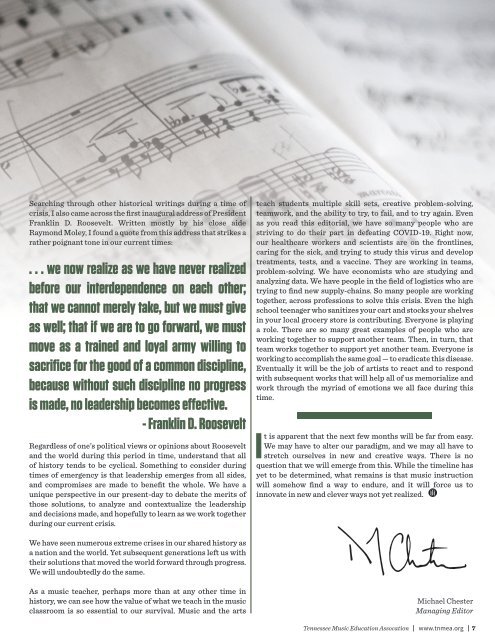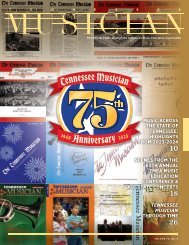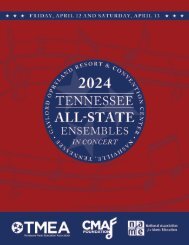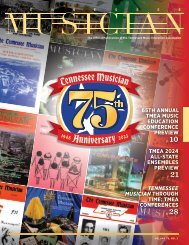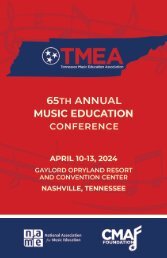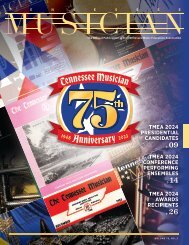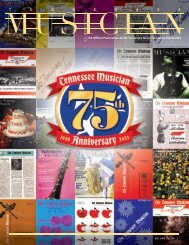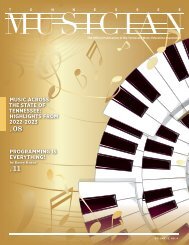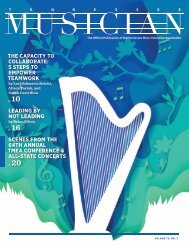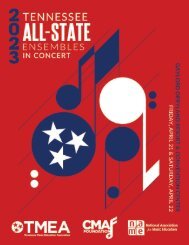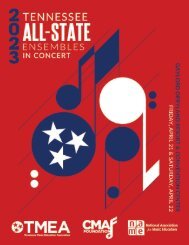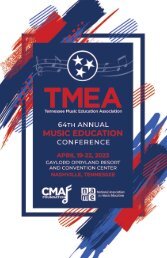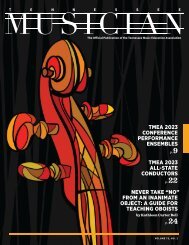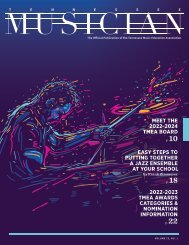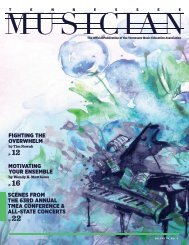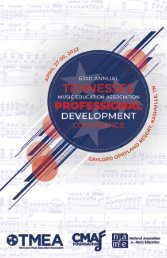TN Musician Vol. 72, No. 3
Create successful ePaper yourself
Turn your PDF publications into a flip-book with our unique Google optimized e-Paper software.
Searching through other historical writings during a time of<br />
crisis, I also came across the first inaugural address of President<br />
Franklin D. Roosevelt. Written mostly by his close aide<br />
Raymond Moley, I found a quote from this address that strikes a<br />
rather poignant tone in our current times:<br />
. . . we now realize as we have never realized<br />
before our interdependence on each other;<br />
that we cannot merely take, but we must give<br />
as well; that if we are to go forward, we must<br />
move as a trained and loyal army willing to<br />
sacrifice for the good of a common discipline,<br />
because without such discipline no progress<br />
is made, no leadership becomes effective.<br />
- Franklin D. Roosevelt<br />
Regardless of one’s political views or opinions about Roosevelt<br />
and the world during this period in time, understand that all<br />
of history tends to be cyclical. Something to consider during<br />
times of emergency is that leadership emerges from all sides,<br />
and compromises are made to benefit the whole. We have a<br />
unique perspective in our present-day to debate the merits of<br />
those solutions, to analyze and contextualize the leadership<br />
and decisions made, and hopefully to learn as we work together<br />
during our current crisis.<br />
teach students multiple skill sets, creative problem-solving,<br />
teamwork, and the ability to try, to fail, and to try again. Even<br />
as you read this editorial, we have so many people who are<br />
striving to do their part in defeating COVID-19. Right now,<br />
our healthcare workers and scientists are on the frontlines,<br />
caring for the sick, and trying to study this virus and develop<br />
treatments, tests, and a vaccine. They are working in teams,<br />
problem-solving. We have economists who are studying and<br />
analyzing data. We have people in the field of logistics who are<br />
trying to find new supply-chains. So many people are working<br />
together, across professions to solve this crisis. Even the high<br />
school teenager who sanitizes your cart and stocks your shelves<br />
in your local grocery store is contributing. Everyone is playing<br />
a role. There are so many great examples of people who are<br />
working together to support another team. Then, in turn, that<br />
team works together to support yet another team. Everyone is<br />
working to accomplish the same goal — to eradicate this disease.<br />
Eventually it will be the job of artists to react and to respond<br />
with subsequent works that will help all of us memorialize and<br />
work through the myriad of emotions we all face during this<br />
time.<br />
It is apparent that the next few months will be far from easy.<br />
We may have to alter our paradigm, and we may all have to<br />
stretch ourselves in new and creative ways. There is no<br />
question that we will emerge from this. While the timeline has<br />
yet to be determined, what remains is that music instruction<br />
will somehow find a way to endure, and it will force us to<br />
innovate in new and clever ways not yet realized.<br />
We have seen numerous extreme crises in our shared history as<br />
a nation and the world. Yet subsequent generations left us with<br />
their solutions that moved the world forward through progress.<br />
We will undoubtedly do the same.<br />
As a music teacher, perhaps more than at any other time in<br />
history, we can see how the value of what we teach in the music<br />
classroom is so essential to our survival. Music and the arts<br />
Michael Chester<br />
Managing Editor<br />
Tennessee Music Education Assocation | www.tnmea.org | 7


